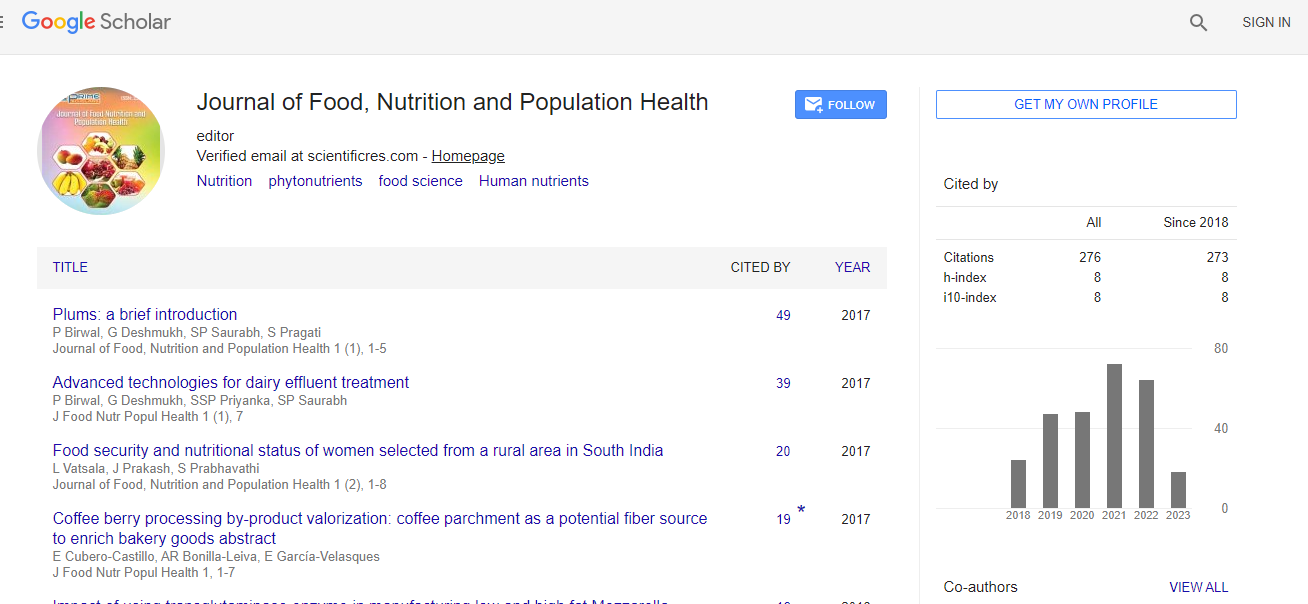Commentary - (2024) Volume 8, Issue 3
Optimizing Neonatal Intensive Care with Tailored Diet Charts
James Wilson*
Department of Food and Dietitian, Yale University, USA
*Correspondence:
James Wilson,
Department of Food and Dietitian, Yale University,
USA,
Email:
Received: 02-Sep-2024, Manuscript No. IPJFNPH-24-21230;
Editor assigned: 04-Sep-2024, Pre QC No. IPJFNPH-24-21230 (PQ);
Reviewed: 18-Sep-2024, QC No. IPJFNPH-24-21230;
Revised: 23-Sep-2024, Manuscript No. IPJFNPH-24-21230 (R);
Published:
30-Sep-2024, DOI: 10.21767/2577-0586.8.3.26
Description
In the Neonatal Intensive Care Unit (NICU), where premature
or critically ill newborns receive specialized care, nutrition
is a cornerstone of treatment. A well-designed diet chart is
crucial for meeting the unique nutritional needs of these
vulnerable infants, supporting their growth and development,
and improving clinical outcomes. Infants in the NICU often
require specialized formulas designed for their specific medical
conditions, such as high-calorie or nutrient-enriched formulas.
For some newborns, nutrients may be provided intravenously
through parenteral nutrition until they can tolerate enteral
feeding. Regular monitoring of weight, growth metrics, and
biochemical markers helps in adjusting the diet chart to ensure
adequate nutrient intake. Based on the baby’s condition and
progress, adjustments to calorie density, protein levels, and
other nutrients are made to optimize growth and development.
Preterm and ill infants may require more frequent feedings
to meet their caloric needs. The diet chart specifies feeding
intervals and amounts tailored to each baby’s needs. As the
baby’s condition improves, the diet chart evolves to include
more advanced feeding stages, from initial milk feeds to a
gradual introduction of solids. Parents are educated on the
importance of the diet chart and how it supports their baby’s
recovery. Regular updates and discussions with healthcare
providers help in understanding and participating in the
care plan. Dietitians, neonatologists, and nurses collaborate
to ensure that the diet chart meets the evolving needs of
each infant and aligns with overall treatment goals. A wellstructured
NICU diet chart is integral to the care of critically
ill and premature newborns, providing a tailored approach
to meet their specific nutritional requirements. Through
frequent monitoring, individualized adjustments, and close
collaboration with parents and healthcare professionals,
these diet charts help ensure that each infant receives the
essential nutrients needed for optimal growth and recovery.
In the Neonatal Intensive Care Unit (NICU), where premature
or critically ill newborns receive specialized care, nutrition is a
cornerstone of treatment. A well-designed diet chart is crucial
for meeting the unique nutritional needs of these vulnerable
infants, supporting their growth and development, and
improving clinical outcomes. A well-structured NICU diet chart
is integral to the care of critically ill and premature newborns,
providing a tailored approach to meet their specific nutritional
requirements. Through frequent monitoring, individualized
adjustments, and close collaboration with parents and
healthcare professionals, these diet charts help ensure that
each infant receives the essential nutrients needed for optimal
growth and recovery. Dietitians, neonatologists, and nurses
collaborate to ensure that the diet chart meets the evolving
needs of each infant and aligns with overall treatment goals.
Parents are educated on the importance of the diet chart and
how it supports their baby’s recovery. Regular updates and
discussions with healthcare providers help in understanding
and participating in the care plan: Infants in the NICU often
require specialized formulas designed for their specific medical
conditions, such as high-calorie or nutrient-enriched formulas.
For some newborns, nutrients may be provided intravenously
through parenteral nutrition until they can tolerate enteral
feeding. Preterm and ill infants may require more frequent
feedings to meet their caloric needs. The diet chart specifies
feeding intervals and amounts tailored to each baby’s needs.
Acknowledgement
None.
Conflict Of Interest
None.
Citation: Wilson J (2024) Optimizing Neonatal Intensive Care with Tailored Diet Charts. J Food Nutr Popul Health. 8:26.
Copyright: © 2024 Wilson J. This is an open-access article distributed under the terms of the Creative Commons Attribution License, which permits unrestricted use, distribution, and reproduction in any medium, provided the original author and source are credited.

